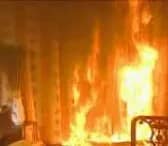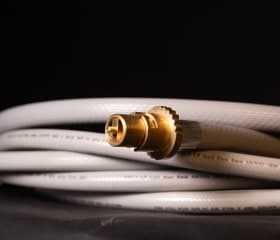Gas Heater Safety – 25 Safety Tips
Are Gas Heaters Safe – Indoor Gas Heater Safety
Gas heaters are very safe when properly maintained and used as instructed.
This includes never using an outdoor gas heater indoors, as they are not designed for inside use.
You should have your indoor gas heater serviced by a qualified gasfitter at least every two years.
Most manufacturers recommend servicing at no longer than two year intervals.
Adequate ventilation is also important, especially if it is a portable unflued gas heater.
You should always read and following the instructions in the owner’s manual.
The safety advice is the same regardless of whether it is a natural gas or LPG (propane) heater.
25 Indoor Gas Heater Safety Tips
1. Always read your gas heater owner’s manual and follow the manufacturer’s directions for proper set-up and safe operation.
2. Fixed gas heaters and bayonets must be installed by licensed gas fitters in accordance with the local gas and electrical authority regulations.
Gas heaters should not be built in unless designed for that purpose.
3. Choose a gas heater that is appropriately sized for the room.
Please refer to manufacturer’s specifications prior to purchase or relocation of the heater.
4. Do not use the gas heater unless it has been certified for use by the Australian Gas Association or SAI Global.
Look for the attached label or badge when you purchase the heater.
5. If equipped with a filter, the filter should be regularly cleaned during heating season to maintain proper air flow.
6. Keep children and pets away from gas heaters.
 A one metre “Kid Free Zone” is a good idea.
A one metre “Kid Free Zone” is a good idea.
Young children should always be supervised to ensure that they DO NOT play with the appliance.
7. Do not permit children to adjust the heater controls or move the heater.
8. Turn gas heaters off when unattended and when you go to bed.
9. Never sit on a gas heater.
10. Do not cover or place articles on or in a gas heater.
 11. Keep gas heaters at least one metre away from all flammable objects including furniture, drapes, books and boxes.
11. Keep gas heaters at least one metre away from all flammable objects including furniture, drapes, books and boxes.
Windows covering that can be wind blown into the heater should be restrained.
12. Never use a gas heater to dry clothing, shoes or other articles.
13. Never place the gas heater where towels or other objects could fall on the heater and start a fire.
14. Gas heaters should only be used in rooms with adequate ventilation.
Fixed ventilation must conform to local regulations.
15. Never use a portable gas heater in a bedroom, bathroom, toilet, sauna or a room used for sleeping.
Certain flued heaters may be used in bedrooms but check the manufacturer’s specifications before such use.
 16. Portable gas heater hoses & power cords cannot be extended through a doorway into an adjacent room
16. Portable gas heater hoses & power cords cannot be extended through a doorway into an adjacent room
17. In the event that the gas hose or electrical connection should become damaged or the heater malfunctions in any way, do not operate until it is fixed by a qualified service person.
18. Do not operate a gas heater where painting is being done or has recently taken place.
19. Most manufacturers suggest periodic inspection and service of the appliance and installation. Two years is the most common recommendation.
Please refer to your owner’s manual for more information.
20. Never attempt to disassemble or service the heater yourself.
Always use a qualified technician.
 21. Never use or store flammable liquids or aerosols near a gas heater.
21. Never use or store flammable liquids or aerosols near a gas heater.
22. If you have a flued gas heater:
Be sure that you have it professionally installed by a gas fitter.
Regularly check the flue for unobstructed venting.
Be aware that insects, birds and animals can build nests in vent pipes.
If you suspect a problem, call a qualified gas fitter.
23. Do not use outdoor gas heaters indoors.
Outdoor gas heaters may create carbon monoxide.
Carbon monoxide can make you dizzy, give you headaches or flu-like symptoms. Extended exposure can be fatal
24. Never use a gas oven to heat your home.
25. If you smell gas at any time in your home:
 No flames or sparks.
No flames or sparks.- Don’t operate light switches, appliances or telephones.
- Leave the area with the doors and windows left open.
- Shut off the gas at your gas bottle valve(s) by turning clockwise.
- Don’t turn back on until it has been checked by a gas fitter.
- Report the leak to your gas supplier.
- If ELGAS is your gas supplier you can call us on 1800 819 783 from a gas-free location.
- Do not return inside your home until the gas has had time to dissipate.
- DO NOT USE AN ELECTRIC FAN.
- Remember that LPG is heavier than air and can accumulate in low areas and basements.
- Get your system checked by your local gas fitter.
The Smell of Safety – Odourised Gas
In their natural state, LPG (Propane and Butane) and Natural Gas (Methane) are all odourless gases.
The distinctive smell that people associate with these gases is actually added to them as a safety measure.
History of Adding Odourant to Gas
For many decades, the gaseous fuels industry has added odourants to LPG and Natural Gas so that people can detect gas leaks with nothing more than their noses.
Without the addition of an odourant, leaking gas could collect without being detected.
This would create a dangerous condition that could lead to an explosion or fire.
Much research has gone into the science of odourants and Ethyl Mercaptan is almost universally recognised as the best choice.
As a result, it is the most commonly used odourising agent.
The smell of Ethyl Mercaptan is often compared to rotten cabbage.
The strength of the odourant has caused some people to refer to the process of adding the odourant as “stenching”.
How & When it Gets Added
In the case of LPG, the Ethyl Mercaptan is added to the gas as it leaves the main storage terminals.
The amount added and the process are both carefully controlled.
The terminals themselves have gas detectors that can identify gas leaks without any odourant having been added.
Special Cases with No Odourant
There are certain applications where the odourant is not added.
Facilities that use odourless gas must have the same gas detection equipment as the gas terminals.
For example, Butane is commonly used as an aerosol propellant.
Needless to say, we wouldn’t want things like hair spray and deodorant to smell like rotten cabbage!
Odourant Fade
Ethyl Mercaptan is not a perfect odourant.
Under some circumstances, it can fade away and be replaced by a gentler smelling odour that might not be recognised as a gas leak.
Odourant fade is rare but it can happen.
While very few instances of odourant fade have been recorded in Australia, it has happened in other countries.
The presence of rust or moisture within an LPG tank could cause this fade.
To prevent this, new cylinders are filled with dry and inert nitrogen gas, to prevent both rust and eliminate the presence of moisture.
Once filled with LPG, the risk is virtually eliminated.
What You Can Do
LPG users can also assist in avoiding odourant fade by making sure that all disconnected gas cylinders have their valves closed, even when completely empty, to stop air (oxygen) and moisture from getting inside the cylinder.
This helps prevent the possibility of internal rusting.
Rust and moisture are also one of the things that are looked for when gas cylinders are periodically re-inspected.
The presence of either is cause for condemnation of the cylinder.
So, now you know why gas smells the way it does and why it is the ‘Smell of Safety’.
New Residential LPG customer?
New Business LPG customer?
Existing ELGAS customer?
- Elgas to the Rescue with Helicopter LPG Delivery - November 14, 2024
- Outdoor Heaters: Outdoor Gas Heaters – Gas Patio Heater Guide - September 22, 2024
- LPG Meaning – LPG Means: What Does LPG Stand For - August 31, 2024
Steve Reynolds
Technical Consultant
Steve Reynolds is a leading expert in the LPG industry with over 22 years of experience. As part of the national management team at ELGAS, Steve ensures the safe and efficient storage, handling, and transportation of LPG. He serves as the lead investigator for incidents and collaborates with authorities on industry developments.
Steve is a technical advisor to Standards Australia and Gas Energy Australia (GEA), and an active member of the World LPG Association (WLPGA), contributing to global standards and technical reviews. He holds a BSc. (Hons) in Industrial Chemistry from UNSW and has held senior safety and technical roles at ELGAS, making him a trusted authority in LPG safety and standards.

